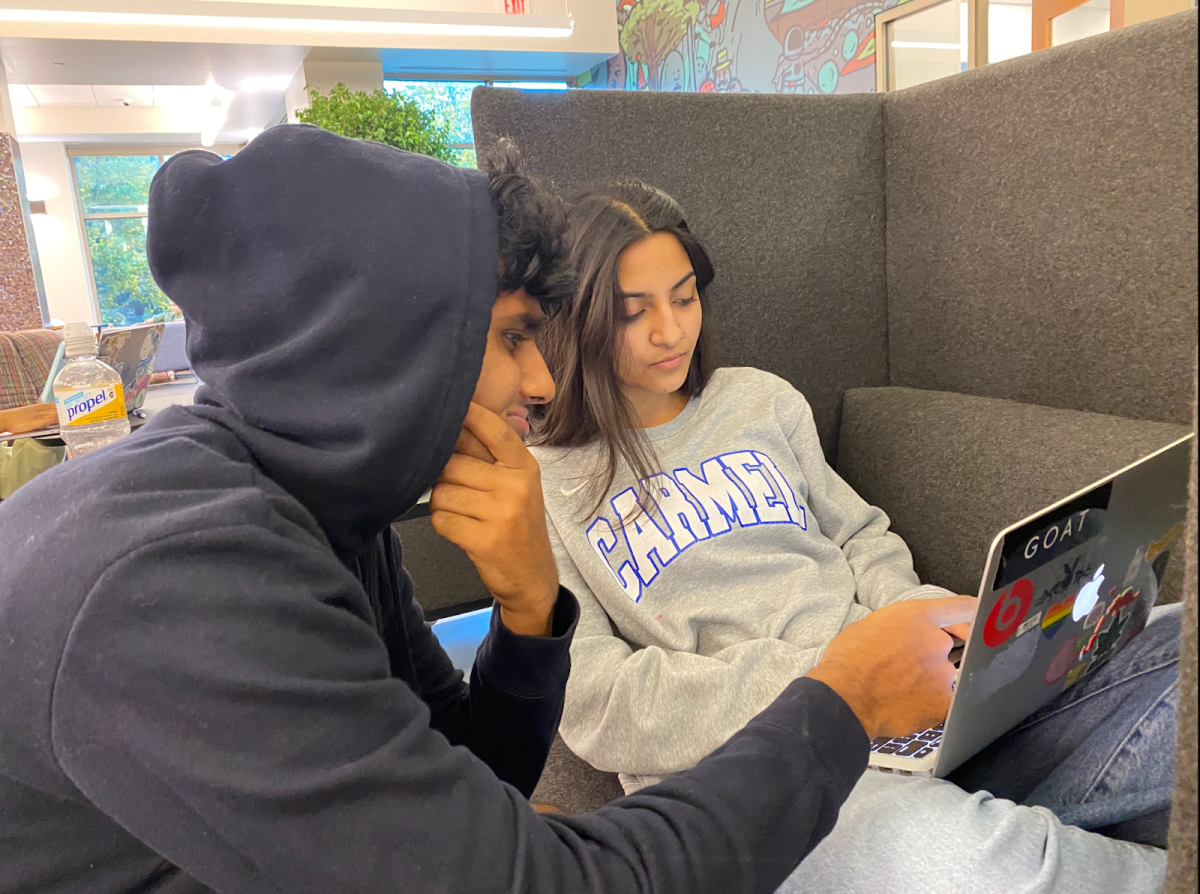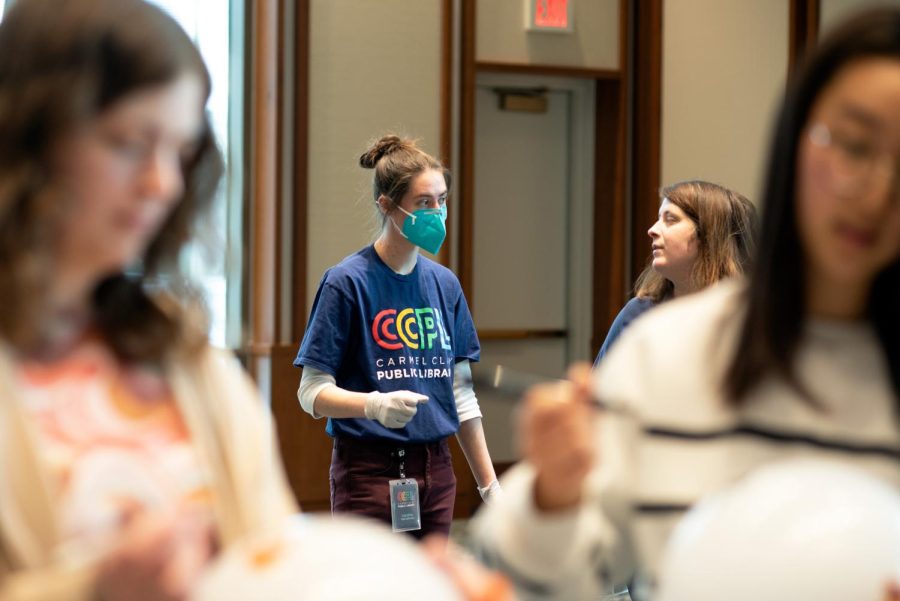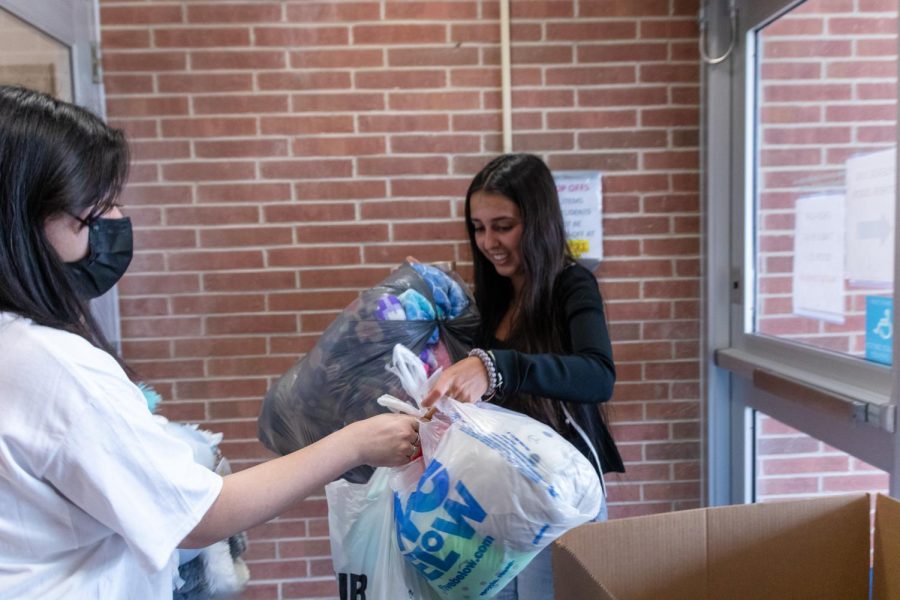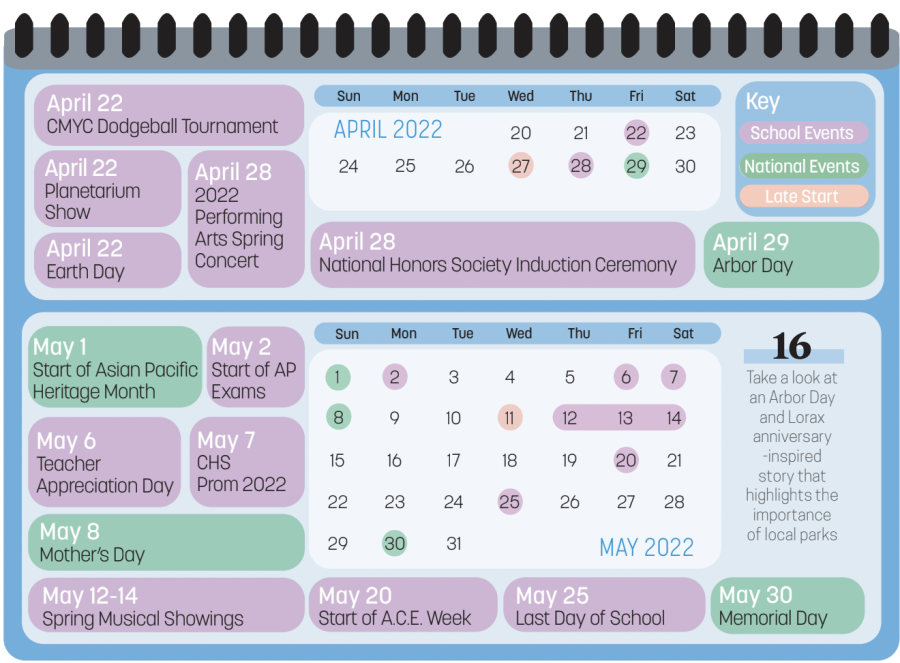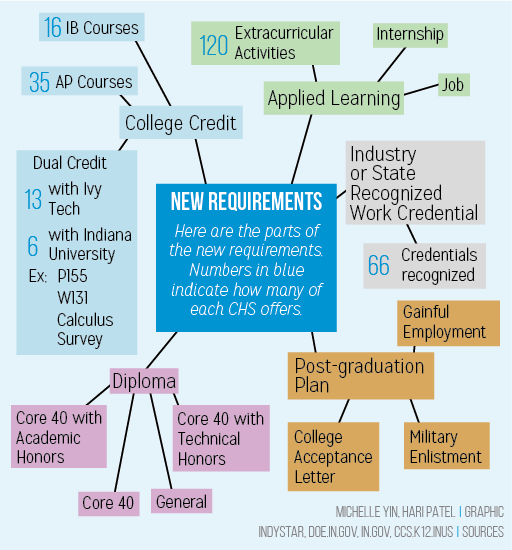
This November, a subcommittee of the Indiana State Board of Education, the Graduation Pathways Panel, recommended new graduation requirements for all high schoolers in Indiana. The state Board of Education approved of the plan on Dec. 7, and the switch will apply to the class of 2023 and beyond.
The plan was passed with sharp criticism from teachers, parents and students. Its main objective is to better prepare qualified Indiana students.
Assistant Principal Brooke Watkins said, “In July, legislation was passed that we would have one diploma. A group was put together to determine what that would look like. So now, we have one diploma but they created multiple pathways and ways in which you may obtain that diploma.”
It’s important to make sure we’re not holding people back but helping them grow and move forward and if this allows more students to successfully not just graduate high school … I think that’s a good thing.
— Assistant Principal Brooke Watkins
Watkins said, these new requirements consist of three different “pathway requirements” which can be fulfilled through multiple “pathway options.” According to the Indiana State Board of Education, students will need to obtain a high school diploma, learn and demonstrate employability skills and demonstrate post-secondary competencies.
To fulfill the second pathway requirement, learn and demonstrate employability skills, there are three available options: obtaining project-based, service-based or work-based learning experience. Completion requirements range from completion of a research project, participation in a volunteer experience, engagement in a school-based activity or employment outside of school.
Similarly, to meet the third requirement students can take the SAT, ACT or Armed Services Vocational Aptitude Battery (ASVAB) and meet a minimum benchmark score. Other options include taking AP, IB or dual-credit courses, or obtaining an nonors diploma. The state will also qualify state- or industry-recognized credentials, certifications and apprenticeship as a fulfillment of this requirement.
According to senior Talha Ahmed, who is currently on track to obtain the Academic Honors diploma, the shift will be positive and beneficial for students.
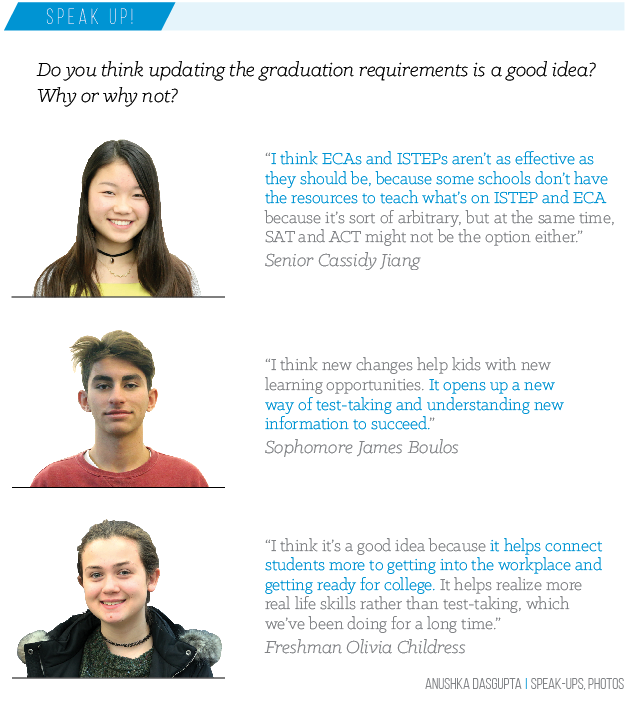
He said, “It’ll definitely help high schoolers gain a broader focus of the world because you’ll get opportunities to volunteer and work.
As of right now, the ISTEP and End-of-Course Assessment (ECA) exams serve as the graduation qualifying exam for the Class of ‘19, ‘20, ‘21 and ‘22. However, this will be discontinued and replaced by college admissions tests.
Ahmed said if Indiana were to switch from ISTEP and ECA exams to college-readiness exams, it would be more practical and useful. He said, “I had to take the ISTEP multiple times and I don’t really think it was that effective. Most people take the SAT and ACT anyway, so it’s better to use that as a graduation (qualifying exam).”
Watkins also said she believes most Carmel students are already on track to fulfill these requirements, but she said CHS needs to do additional work to make fulfilling the second requirement easier.
She said, “Most of our students definitely take the SAT or ACT… We do have a lot of students that are in AP, IB or dual credit classes and a lot  of students that are meeting industry certifications too. But the other components are employability skills. I think that’s an area where we may need to do some work to make sure students are meeting that requirement.”
of students that are meeting industry certifications too. But the other components are employability skills. I think that’s an area where we may need to do some work to make sure students are meeting that requirement.”
The panel has also proposed additional requirements for the state board’s consideration such as furthering career exploration in high school, creating a statewide diploma or having the state adopt a national college-entrance exam.
Watkins said, “I think anytime you give choices and opportunities it’s a good thing. It’s important to make sure we’re not holding people back but helping them grow and move forward and if this allows more students to successfully not just graduate high school, but have a plan and a path when they leave-whatever that looks like: military, career or college- then I think that’s a good thing. But there will definitely be some growing pains.”


































![British royalty are American celebrities [opinion]](https://hilite.org/wp-content/uploads/2024/03/Screenshot-2024-03-24-1.44.57-PM.png)



















![Chelsea Meng on her instagram-run bracelet shop [Biz Buzz]](https://hilite.org/wp-content/uploads/2024/04/IMG_2446-1200x838.jpg)
![Review: Quiet on Set: The Dark Side of Kids TV is the long awaited exposé of pedophilia within the children’s entertainment industry [MUSE]](https://hilite.org/wp-content/uploads/2024/04/unnamed.jpg)
![Review: “The Iron Claw” cannot get enough praise [MUSE]](https://hilite.org/wp-content/uploads/2024/04/unnamed.png)
![Review: “The Bear” sets an unbelievably high bar for future comedy shows [MUSE]](https://hilite.org/wp-content/uploads/2024/03/unnamed.png)
![Review: “Mysterious Lotus Casebook” is an amazing historical Chinese drama [MUSE]](https://hilite.org/wp-content/uploads/2024/03/0.webp)
![Review in Print: Maripaz Villar brings a delightfully unique style to the world of WEBTOON [MUSE]](https://hilite.org/wp-content/uploads/2023/12/maripazcover-1200x960.jpg)
![Review: “The Sword of Kaigen” is a masterpiece [MUSE]](https://hilite.org/wp-content/uploads/2023/11/Screenshot-2023-11-26-201051.png)
![Review: Gateron Oil Kings, great linear switches, okay price [MUSE]](https://hilite.org/wp-content/uploads/2023/11/Screenshot-2023-11-26-200553.png)
![Review: “A Haunting in Venice” is a significant improvement from other Agatha Christie adaptations [MUSE]](https://hilite.org/wp-content/uploads/2023/11/e7ee2938a6d422669771bce6d8088521.jpg)
![Review: A Thanksgiving story from elementary school, still just as interesting [MUSE]](https://hilite.org/wp-content/uploads/2023/11/Screenshot-2023-11-26-195514-987x1200.png)
![Review: When I Fly Towards You, cute, uplifting youth drama [MUSE]](https://hilite.org/wp-content/uploads/2023/09/When-I-Fly-Towards-You-Chinese-drama.png)
![Postcards from Muse: Hawaii Travel Diary [MUSE]](https://hilite.org/wp-content/uploads/2023/09/My-project-1-1200x1200.jpg)
![Review: Ladybug & Cat Noir: The Movie, departure from original show [MUSE]](https://hilite.org/wp-content/uploads/2023/09/Ladybug__Cat_Noir_-_The_Movie_poster.jpg)
![Review in Print: Hidden Love is the cute, uplifting drama everyone needs [MUSE]](https://hilite.org/wp-content/uploads/2023/09/hiddenlovecover-e1693597208225-1030x1200.png)
![Review in Print: Heartstopper is the heartwarming queer romance we all need [MUSE]](https://hilite.org/wp-content/uploads/2023/08/museheartstoppercover-1200x654.png)






















![Review: Ladybug & Cat Noir: The Movie, departure from original show [MUSE]](https://hilite.org/wp-content/uploads/2023/09/Ladybug__Cat_Noir_-_The_Movie_poster-221x300.jpg)

![Review: Next in Fashion season two survives changes, becomes a valuable pop culture artifact [MUSE]](https://hilite.org/wp-content/uploads/2023/03/Screen-Shot-2023-03-09-at-11.05.05-AM-300x214.png)
![Review: Is The Stormlight Archive worth it? [MUSE]](https://hilite.org/wp-content/uploads/2023/10/unnamed-1-184x300.png)


